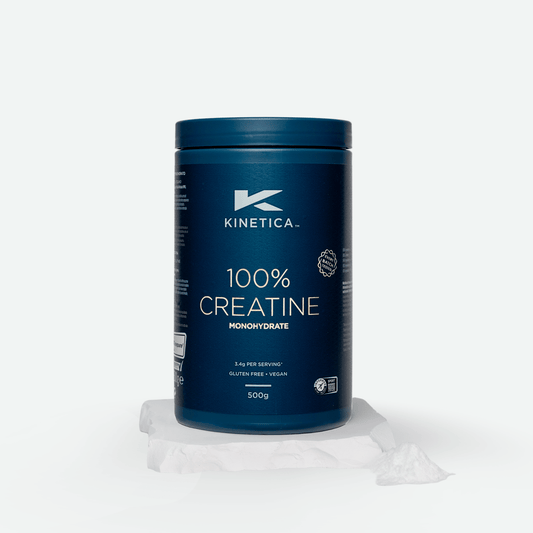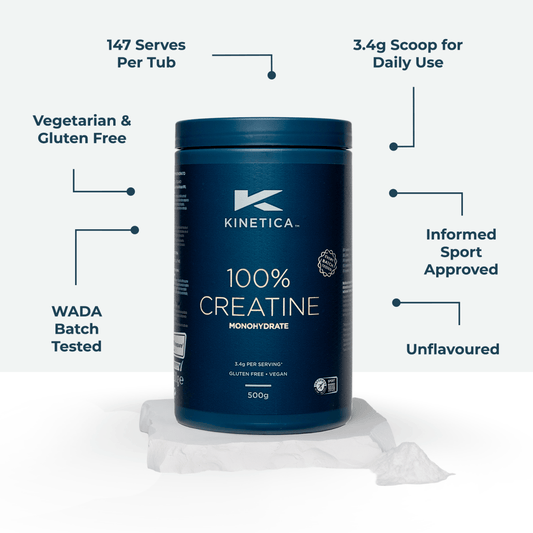Creatine Benefits and Side Effects: What You Need to Know
What is Creatine?
Benefits of Creatine?
Side Effects of Creatine?
How much should I take?
Why choose Kinetica Creatine?
Creatine is a naturally occurring compound that is synthesized in the liver, pancreas, and kidneys. It is also found in foods such as meat and fish. Many athletes and non-athletes alike take creatine supplements to increase muscle mass and strength, improve athletic performance, and enhance cognitive function.
Research has also shown that creatine can help with post-exercise recovery, injury prevention, rehabilitation, and concussion and/or spinal cord neuroprotection. In this article, we will explore the benefits and side effects of creatine.
What is Creatine?
Creatine is a nitrogenous organic acid that occurs naturally in the body. It is involved in the production of adenosine triphosphate (ATP), which is the primary source of energy for the muscles. Creatine is also found in foods such as meat and fish.
Note: ATP is like a tiny battery that helps our muscles move. When we exercise, our muscles use up a lot of ATP, so we need more to keep going. Creatine helps make more ATP so our muscles can keep working hard to increase strength and power.
Benefits of Creatine
Creatine has been shown to have several benefits for athletes and non-athletes alike. Some of the benefits of creatine include:- Muscle gain: Creatine has been shown to increase muscle mass and strength, which can be beneficial for athletes or anyone looking to build strength or muscle.
- Improved athletic performance: Creatine can help to improve high-intensity exercise performance, such as sprinting and weightlifting.
- Faster recovery: Creatine can help to reduce muscle damage and inflammation, which can lead to faster recovery after exercise.
- Improved brain function: Creatine has been shown to improve cognitive function, memory, and learning.

Shop Now: Kinetica 100% Creatine Monohydrate
Side Effects of Creatine
Despite its many benefits, there are some potential side effects of creatine that you should be aware of. However, many of the myths surrounding creatine side effects have been debunked by scientific research. Some of the common myths about creatine side effects include:- Kidney damage: There is no evidence to suggest that creatine causes kidney damage in healthy people.
- Dehydration: Creatine can cause water retention in the muscles, but there is no evidence to suggest that it causes dehydration.
- Digestive issues: Some people may experience digestive issues such as bloating and diarrhea when taking creatine, but these side effects are usually mild and temporary.
- Weight Gain: Some people worry that taking creatine supplements will cause them to gain weight. While it is true that creatine can cause your muscles to retain water, which can lead to some initial weight gain, this is not the same as gaining fat. In fact, research has shown that creatine supplementation does not lead to significant fat gain. However, it is important to note that any weight gain associated with creatine supplementation is likely to be temporary and will subside once you stop taking the supplement.

How much should I take?
The benefits may be provided by ensuring habitual low dietary creatine intake of 3-5 g/day. There is no need to "load" creatine. Some people may choose to take a higher dose of creatine for the first week or so to help saturate their muscles with the compound more quickly, but this is not necessary.
Why choose Kinetica Creatine?
If you are considering taking a creatine supplement, it is important to choose a high-quality product. Kinetica Creatine Powder is made from creapure, which is the highest-grade creatine available. Kinetica Creatine is also WADA batch tested, Informed Sport approved and manufactured to the highest standards, so you can be sure that you are getting a safe and effective product.
About the author.
Gemma McGuinness is a performance nutritionist with a BSc (Hons) with DPP in Food & Nutrition and an MSc in Sports & Exercise Nutrition (SENr) from Ulster University. She is working with daveynutrition and is currently in charge of the nutrition support for Motorsport Ireland Rally Academy.
Whether you are an elite athlete looking to take things to the next level or just want to progress in your health or performance at any level, from any starting point, Gemma has experience in one-to-one consultations, nutrition support for team sport athletes and group workshops.
Gemma has also competed in several European tournaments as a former underage Irish International soccer player, represented Ireland in the world University games in Italy and has played with Derry City FC in the Northern Ireland womens premiership, Sligo Rovers in their first season in the Women's League of Ireland and is currently playing with Galway United Women’s FC.
References:
Branch JD. Effect of creatine supplementation on body composition and performance: a meta-analysis. Int J Sport Nutr Exerc Metab. 2003 Jun;13(2):198-226. doi: 10.1123/ijsnem.13.2.198. PMID: 12945830.
Hultman E, Söderlund K, Timmons JA, Cederblad G, Greenhaff PL. Muscle creatine loading in men. J Appl Physiol (1985). 1996 Jul;81(1):232-7. doi: 10.1152/jappl.1996.81.1.232. PMID: 8828669.
Pinto CL, Botelho PB, Pimentel GD, Campos-Ferraz PL, Mota JF. Creatine supplementation and glycemic control: a systematic review. Amino Acids. 2016 Sep;48(9):2103-29. doi: 10.1007/s00726-016-2288-0. Epub 2016 Jun 29. PMID: 27356960.
Rawson ES, Venezia AC. Use of creatine in the elderly and evidence for effects on cognitive function in young and old. Amino Acids. 2011 May;40(5):1349-62. doi: 10.1007/s00726-011-0871-5. Epub 2011 Mar 29. PMID: 21448593.
Stout JR, Antonio J, Kalman D, et al. International Society of Sports Nutrition position stand: creatine supplementation and exercise. J Int Soc Sports Nutr. 2007 Aug 30;4:6. doi: 10.1186/1550-2783-4-6. PMID: 17908288; PMCID: PMC2048496.







